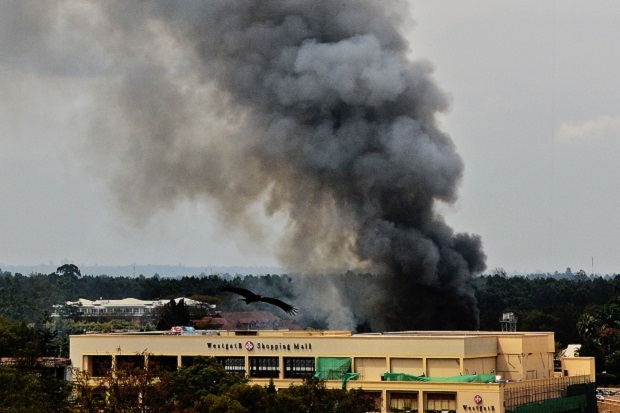Not so long ago politicians were hailing the end of al-Qaeda and the global jihad movement. By the middle of 2011, key ideologues like Osama bin Laden and Anwar al-Awlaki were dead. Arab Street also appeared to have embraced peaceful protest, with popular uprisings unseating seemingly entrenched regimes in Tunisia and Egypt. A new dawn, we were told, was breaking.
The weekend’s events have brought that hopeless optimism into sharp relief. The terrorist siege of the Westgate shopping mall in Kenya continues, with around 70 people dead so far. Elsewhere, at least 80 Christians were killed in a suicide attack outside a church in the Pakistani city of Peshawar yesterday. Additional suicide attacks in Pakistan’s Balochistan province and in Iraq also killed scores of Shia over the weekend.
While the attacks in Pakistan, Iraq and Kenya are partly borne of local political issues, the overall resurgence of the global jihad movement can be traced to the conflict in Syria. Just when the narrative of peaceful protest seemed to undermine al-Qaeda’s assertion that only violent means could bring change to Muslim countries, the deteriorating situation in Syria provided jihadists with the opening they needed to reassert themselves.
Al-Qaeda and its affiliates now control significant parts of eastern Syria and parts of the north too. Moreover, they have attracted foreign fighters from across the world, galvanising the global jihad movement. Emboldened by the group’s activities in the Levant, jihadists in South Asia, the Arabian Peninsula and across Africa have been keen to replicate their apparent successes. A similar process occurred when the Soviet Union was defeated in Afghanistan. A wave of jihadists was inspired to fight in Chechnya, Bosnia and Sudan. The same was true after 9/11 when fighters poured into Afghanistan and Iraq hoping to confront the West.
The Obama administration has been keen to draw a line under the War on Terror; there is a sense in Washington that fighting international terrorism was a misguided obsession of the Bush administration. British politicians are also reluctant to talk about the terrorist threat. There won’t be much said about it at any party conference this year. After the wars in Afghanistan and Iraq, public opinion considers the subject passé, too unfashionable, too confusing. Weariness has descended.
Yet British citizens are still actively involved in terrorist networks operating in Pakistan, Syria, Iraq and Somalia. Indeed, at least one Briton is believed to have participated in the attack on the Westgate mall in Kenya. Samantha Lewthwaite, a widow to one of the 7/7 bombers, is also involved with the same group and is currently on the run.
As the weekend’s events have shown, ignoring the threat of domestic radicalisation and international terrorism won’t make it go away. Our politicians must address it, but they’ll also need our support to do so.






Comments